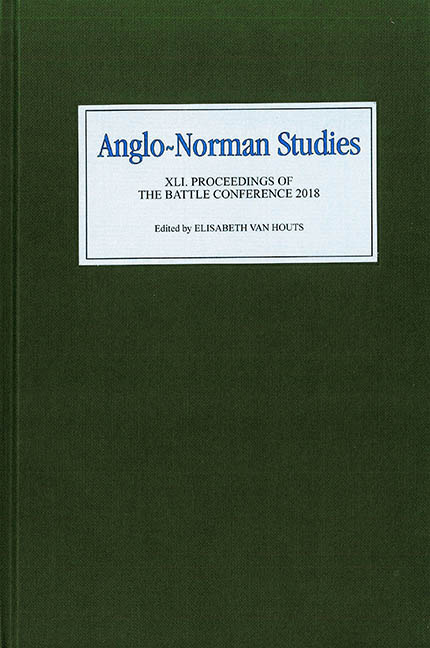Book contents
- Frontmatter
- Contents
- Illustrations and Tables
- Editor's Preface
- Abbreviations
- Horses, Knights and Tactics (The R. Allen Brown Memorial Lecture, 2018)
- Baldwin of Forde, Bartholomew of Exeter and the Authorship of the Liber de sectis hereticorum et orthodoxe fidei dogmata
- Evidence of the Ordinary: Wives and Children of the Clergy in Normandy and England, 1050–1150
- Anthropology, Feud and De obsessione Dunelmi
- New Archaeologies of the Norman Conquest
- An Angevin Imperial Context for the Amboise–Anjou Narrative Programme
- The Noble Leper: Responses to Leprosy in the Twelfth and Thirteenth Centuries
- Royal Taxation and Written Record in Eleventh-Century England and Ninth-Century West Francia
- Early Royal Rights in the Liberty of St Edmund (The Marjorie Chibnall Memorial Essay, 2018)
- Castle Construction, Conquest and Compensation (The Christine Mahany Memorial Lecture)
- Four Scenes from the Chanson de Roland on the Façade of Barletta Cathedral (Southern Italy)
- ‘The Jews are our Donkeys’: Anti-Jewish Polemic in Twelfth-Century French Vernacular Exegesis
- Miscellaneous Endmatter
The Noble Leper: Responses to Leprosy in the Twelfth and Thirteenth Centuries
Published online by Cambridge University Press: 29 March 2020
- Frontmatter
- Contents
- Illustrations and Tables
- Editor's Preface
- Abbreviations
- Horses, Knights and Tactics (The R. Allen Brown Memorial Lecture, 2018)
- Baldwin of Forde, Bartholomew of Exeter and the Authorship of the Liber de sectis hereticorum et orthodoxe fidei dogmata
- Evidence of the Ordinary: Wives and Children of the Clergy in Normandy and England, 1050–1150
- Anthropology, Feud and De obsessione Dunelmi
- New Archaeologies of the Norman Conquest
- An Angevin Imperial Context for the Amboise–Anjou Narrative Programme
- The Noble Leper: Responses to Leprosy in the Twelfth and Thirteenth Centuries
- Royal Taxation and Written Record in Eleventh-Century England and Ninth-Century West Francia
- Early Royal Rights in the Liberty of St Edmund (The Marjorie Chibnall Memorial Essay, 2018)
- Castle Construction, Conquest and Compensation (The Christine Mahany Memorial Lecture)
- Four Scenes from the Chanson de Roland on the Façade of Barletta Cathedral (Southern Italy)
- ‘The Jews are our Donkeys’: Anti-Jewish Polemic in Twelfth-Century French Vernacular Exegesis
- Miscellaneous Endmatter
Summary
As has been written about at length, medieval attitudes towards and responses to leprosy were complex and, at times, deeply ambiguous, even contradictory. This paper uses case studies, predominantly drawn from the northern French nobility, to consider how responses to leprosy among the nobility can be detected in their interactions with lepers and in their religious patronage. It will consider whether the patronage of leper houses can be attributed to the commemoration of family members, or whether donations reflect familial patronage traditions. In particular, it will discuss the families of two known noble lepers from northern France and the ways in which their families appear to have reacted to their illness: the first, Theobald VI, count of Blois; and the second, Ralph II, count of Vermandois. How far did reactions to their illness reflect a sympathetic approach to lepers?
Medieval perceptions of leprosy have long been the subject of speculation among historians, with the majority acknowledging that attitudes were both complex and contradictory. Historiography traditionally focused on the issues surrounding segregation and biblical attitudes towards leprosy. Until the 1990s, scholarship predominantly argued that lepers were socially excluded, and that their illness was seen as a form of punishment for their sins. Traditionally, it was believed that the emphasis on exclusion and the location of leprosaria outside the city walls was an indication that lepers should be set apart from society. Saul Brody and others have argued that while the church might have viewed leprosy as a sign that God had chosen to grant the sufferer salvation, it was also a diagnosis of sin and spiritual corruption. Brody emphasized that this was a disease of the soul, as well as the body.
However, since the work of Touati, Rawcliffe and, as we shall see, Demaitre, the notion that those suffering with leprosy were excluded and stigmatized has been dispelled; instead greater emphasis has been placed on more compassionate attitudes towards the illness and the ways in which those suffering were still integrated in society. The focus has shifted away from the belief that lepers were shunned and excluded, to one that recognizes the ways in which they remained a part of society. Touati, in particular, propounds the more positive idea that, rather than exclusion, leprosaria were instead intended for the conversion of lepers to religious life.
- Type
- Chapter
- Information
- Anglo-Norman Studies XLIProceedings of the Battle Conference 2018, pp. 119 - 134Publisher: Boydell & BrewerPrint publication year: 2019



